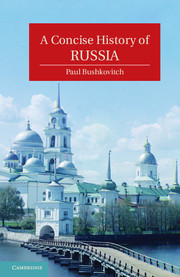Book contents
- Frontmatter
- Contents
- List of Figures
- Abbreviations
- Acknowledgments
- Prologue
- 1 Russia before Russia
- 2 Moscow, Novgorod, Lithuania, and the Mongols
- 3 The Emergence of Russia
- 4 Consolidation and Revolt
- 5 Peter the Great
- 6 Two Empresses
- 7 Catherine the Great
- 8 Russia in the Age of Revolution
- 9 The Pinnacle of Autocracy
- 10 Culture and Autocracy
- 11 The Era of the Great Reforms
- 12 From Serfdom to Nascent Capitalism
- 13 The Golden Age of Russian Culture
- 14 Russia as an Empire
- 15 Autocracy in Decline
- 16 War and Revolution
- 17 Compromise and Preparation
- 18 Revolutions in Russian Culture
- 19 Building Utopia
- 20 War
- 21 Growth, Consolidation, and Stagnation
- 22 Soviet Culture
- 23 The Cold War
- Epilogue
- Further Reading
- Index
Epilogue
The End of the USSR
Published online by Cambridge University Press: 05 June 2012
- Frontmatter
- Contents
- List of Figures
- Abbreviations
- Acknowledgments
- Prologue
- 1 Russia before Russia
- 2 Moscow, Novgorod, Lithuania, and the Mongols
- 3 The Emergence of Russia
- 4 Consolidation and Revolt
- 5 Peter the Great
- 6 Two Empresses
- 7 Catherine the Great
- 8 Russia in the Age of Revolution
- 9 The Pinnacle of Autocracy
- 10 Culture and Autocracy
- 11 The Era of the Great Reforms
- 12 From Serfdom to Nascent Capitalism
- 13 The Golden Age of Russian Culture
- 14 Russia as an Empire
- 15 Autocracy in Decline
- 16 War and Revolution
- 17 Compromise and Preparation
- 18 Revolutions in Russian Culture
- 19 Building Utopia
- 20 War
- 21 Growth, Consolidation, and Stagnation
- 22 Soviet Culture
- 23 The Cold War
- Epilogue
- Further Reading
- Index
Summary
The collapse of the Soviet Union and the reappearance of Russia were momentous events, but events that are difficult to describe in any depth. The main outlines are clear, as much of its fall took place in public under intense scrutiny by the Soviet population, Russian and foreign journalists, and the governments of the world. Yet many of the crucial decisions took place behind closed doors and are too recent to be the object of study by historians. Many of the major events of the time have already fallen from memory, and others have been probably exaggerated in popular accounts as well as in the few academic attempts at analysis. Real sources scarcely exist, and sensational memoirs and fragments of information do not make good history. To complicate matters, perceptions of the events outside Russia and among the Russian and most former Soviet populations differ profoundly. All that is possible is a sketch of the events and of some of the more obvious social, political, and economic trends of a quarter of a century of upheaval, with some attention to the understanding of these events and trends by the Russians who lived through them.
Mikhail Gorbachev became the General Secretary of the Communist Party in March of 1985, just a few hours after the death of Chernenko. He brought with him a new team – among others, Aleksandr Iakovlev as an adviser and Boris Yeltsin, whom he put in charge of the Moscow party organization. Gorbachev belonged to a new generation: born in 1931, he graduated from Moscow University in law in 1955. The last Soviet leader with a university education had been Lenin. After university Gorbachev soon became the party boss of his native Stavropol’, an agricultural district in the plains north of the Caucasus. In 1979 he entered the Politburo. Iakovlev was older, born in 1923, and had risen through the party propaganda network in the 1950s. He spent 1958 at Columbia University in New York on an exchange, and was ambassador to Canada from 1973 to 1983. These two men would lead the attempt to reform the Soviet order. Their nemesis was another party boss from the provinces, Boris Yeltsin. Yeltsin, born the same year as Gorbachev, graduated from the Technical University in Sverdlovsk, also in 1955, and went on to become the party boss of the Sverdlovsk region, one of the USSR's key industrial regions. He remained at that post from 1976 until Gorbachev brought him to Moscow.
- Type
- Chapter
- Information
- A Concise History of Russia , pp. 447 - 460Publisher: Cambridge University PressPrint publication year: 2011



